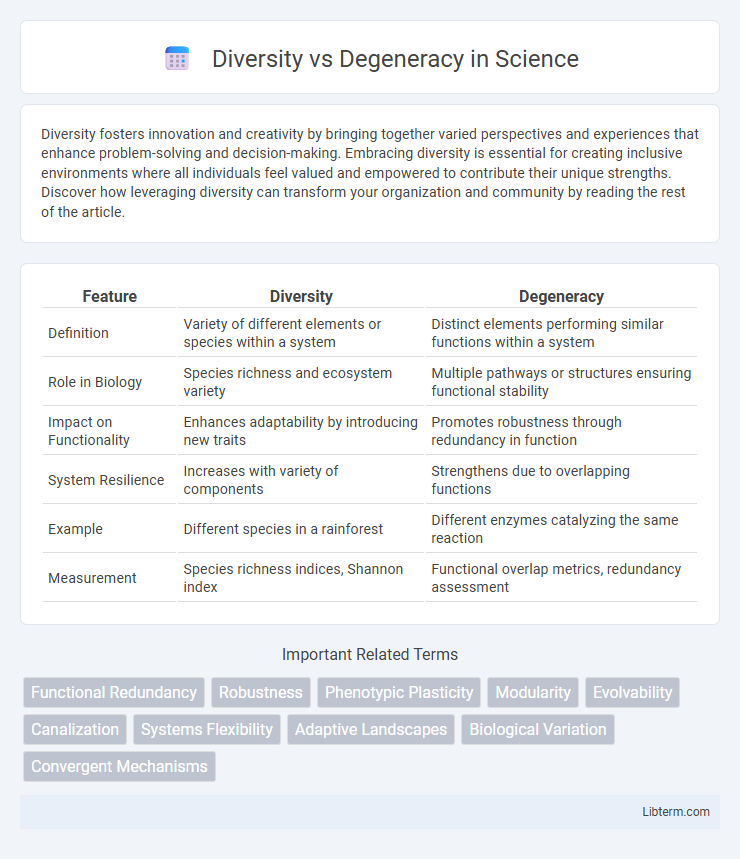Diversity fosters innovation and creativity by bringing together varied perspectives and experiences that enhance problem-solving and decision-making. Embracing diversity is essential for creating inclusive environments where all individuals feel valued and empowered to contribute their unique strengths. Discover how leveraging diversity can transform your organization and community by reading the rest of the article.
Table of Comparison
| Feature | Diversity | Degeneracy |
|---|---|---|
| Definition | Variety of different elements or species within a system | Distinct elements performing similar functions within a system |
| Role in Biology | Species richness and ecosystem variety | Multiple pathways or structures ensuring functional stability |
| Impact on Functionality | Enhances adaptability by introducing new traits | Promotes robustness through redundancy in function |
| System Resilience | Increases with variety of components | Strengthens due to overlapping functions |
| Example | Different species in a rainforest | Different enzymes catalyzing the same reaction |
| Measurement | Species richness indices, Shannon index | Functional overlap metrics, redundancy assessment |
Understanding Diversity: Definition and Importance
Diversity refers to the presence of a wide range of different elements, characteristics, or species within a system, population, or environment. Its importance lies in enhancing resilience, adaptability, and innovation by providing varied perspectives, genetic material, or functional roles. Understanding diversity enables better decision-making in ecological management, organizational development, and social dynamics by fostering inclusive and sustainable growth.
What is Degeneracy? Clarifying Misconceptions
Degeneracy in biological systems refers to the ability of structurally different elements to perform the same function or yield the same output, enhancing system robustness and adaptability. This concept is often misunderstood as a negative trait implying decay or loss of function, whereas it actually highlights functional redundancy that supports complex system resilience. Unlike diversity, which involves variability among components, degeneracy emphasizes overlapping functions among diverse elements, crucial for evolutionary innovation and stability.
Diversity in Nature, Society, and Culture
Diversity in nature enhances ecosystem resilience by supporting a wide range of species interactions and genetic variability, which promotes stability and adaptability. In society, diversity fosters innovation and social cohesion by bringing together varied perspectives, skills, and experiences that drive collective problem-solving and cultural exchange. Cultural diversity enriches human experience, preserving unique traditions, languages, and worldviews that strengthen community identity and promote mutual understanding.
Degeneracy: Origins and Modern Interpretations
Degeneracy originated in the 18th and 19th centuries as a concept linked to biological and social decline, often used to justify discriminatory beliefs about race and morality. In modern interpretations, degeneracy is analyzed through cultural, psychological, and medical frameworks, challenging earlier pejorative connotations and exploring its nuanced roles in art, literature, and human behavior. Contemporary discourse emphasizes degeneration as a metaphor for systemic dysfunction or entropy rather than a fixed biological condition.
Diversity vs Degeneracy: Key Differences
Diversity refers to the variety and abundance of different elements or species within a system, promoting resilience and adaptability. Degeneracy, in contrast, involves structurally different components performing similar functions, enhancing robustness despite individual failures. The key difference lies in diversity emphasizing distinct entities, while degeneracy highlights functional overlap among varied elements.
Social Impacts of Promoting Diversity
Promoting diversity enhances innovation, creativity, and problem-solving by incorporating varied perspectives from different cultural, ethnic, and social backgrounds. Social cohesion and mutual respect improve as diverse communities foster understanding and reduce prejudice. However, mismanagement or superficial approaches to diversity can lead to social fragmentation and tensions, underscoring the need for inclusive, equitable policies that support genuine integration.
The Risks of Mislabeling Diversity as Degeneracy
Mislabeling diversity as degeneracy undermines social cohesion by perpetuating harmful stereotypes and fostering exclusion. This misinterpretation distorts the benefits of cultural, intellectual, and biological diversity that promote innovation and resilience within communities. Recognizing diversity as a strength is essential to counteract biases that lead to discrimination and social fragmentation.
Diversity in the Workplace: Benefits and Challenges
Diversity in the workplace fosters innovation and creativity by bringing together varied perspectives, experiences, and skills, which enhances problem-solving and decision-making processes. Companies with diverse teams often see improved employee engagement, better customer insights, and increased market competitiveness, translating into higher financial performance. Challenges include managing communication barriers, unconscious bias, and potential conflicts, requiring strong inclusion strategies and continuous training to create a cohesive and productive work environment.
Ethical Perspectives on Diversity and Degeneracy
Ethical perspectives on diversity emphasize the intrinsic value of varied cultures, identities, and ideas in fostering inclusive societies and promoting human dignity. Conversely, degeneracy is often framed as moral decline, characterized by behaviors considered harmful or destabilizing to social order and ethical norms. Debates around these concepts focus on balancing respect for diversity with maintaining ethical standards that safeguard communal well-being.
Building Inclusive Societies: Moving Beyond Stereotypes
Building inclusive societies requires embracing diversity as a source of strength and innovation rather than perceiving differences as degeneracy or decline. Overcoming stereotypes involves recognizing the value of varied cultural, ethnic, and social identities in enriching community resilience and fostering mutual respect. Policies promoting equity, education, and open dialogue empower marginalized groups and challenge prejudiced narratives, enabling cohesive and dynamic social environments.
Diversity Infographic

 libterm.com
libterm.com